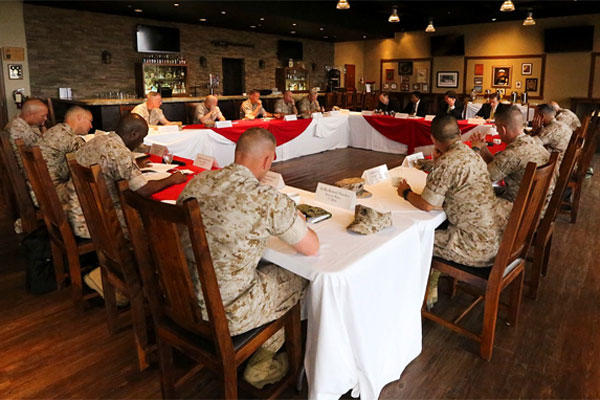Veterans' advocacy groups are clashing with each other over proposed changes to military retirement, health care and other benefits.
The Military Coalition, an umbrella group of almost three dozen military, veterans and uniformed services organizations, couldn't reach an accord on the recommendations of the congressionally mandated Military Compensation and Retirement Modernization Commission.
While most of the coalition came together in finding common positions to the sweeping proposals, "we couldn't get consensus," Mike Hayden, co-chair of the group who also serves as director of government relations for the Military Officers Association of America, told reporters on Tuesday.
The organizations have distinct ideas on how the proposals would help or hurt the various demographics of the armed forces they represent. The differences will be on display Wednesday, when Hayden and officials from several other groups testify before the House Armed Services Committee's Military Personnel Subcommittee, chaired by Rep. Joe Heck, R-Nevada.
"It'll make for a very interesting dialogue as we go forward," Hayden said.
For example, MOAA, the largest officers' association, is cool to the idea of offering troops a 401(k)-like retirement plan. While Hayden said the proposal warrants "further analysis and study," he also warned that reducing the value of the existing plan "provides a greater incentive to leave rather than stay," according to his prepared testimony.
Historically, under the current defined-benefit plan, officers and enlisted personnel who separate at the 20-year mark receive half of their final basic pay upon retirement and every year thereafter. The commission proposed reducing the figure from 50 percent to 40 percent, in part to fund a 401(k)-like defined-contribution plan for the more than eight in 10 service members who leave the military without receiving any retirement pay.
The Naval Enlisted Reserve Association, which represents enlisted personnel, welcomes the idea of enrolling troops into the expanded Thrift Savings Plan, in part because it would offer matching contributions of up to 5 percent and could be rolled over into a private-sector plan upon exiting the military.
"It's going to give first-time enlistees, or those who don't get to stay for a career, something to take home down the road," Stephen Sandy, the association's executive director, said in a telephone interview.
Even so, both the Naval Enlisted Reserve Association and the Military Officers Association of America share a similar concern that the matching contribution, as proposed by the commission, would end for troops after they hit the 20-year mark.
"This creates a major disincentive to serve beyond 20 years and greatly devalues their retirement ... compared to the existing, cliff-vesting retirement benefit," Hayden says in his written remarks.
In January, after nearly two years of review, the Military Compensation and Retirement Modernization Commission released a report with 15 recommendations designed to give troops, retirees and their families more benefits options while saving the Defense Department $12 billion a year in personnel costs by 2040.
Some of the veterans' organizations also disagree on other proposals, including health care.
Reserve associations, for instance, may be warmer to the idea of doing away with the three Tricare plans for military families, reservists and working-age retirees and instead giving recipients the option to choose from a list of commercial plans.
Christopher Carney, a commissioner on the blue-ribbon panel and a Navy reservist, had a favorite line when testifying about his difficulty in finding health care providers in the Tricare network: "As a reservist who did not have good access to Tricare, it wasn't called Tricare for us. It was called try-to-find care."
While MOAA agrees the status quo is "unacceptable," it wants more discussion on the potential impacts of replacing Tricare with a civilian-managed substitute similar to the Federal Employee Health Benefits Program. "This change could have far-reaching implications and presents a high level of risk to medical readiness," according to Hayden's testimony.
Meanwhile, the organization outright rejects the commission's proposals to offer a new survivor benefit plan, create a new Joint Readiness Command to oversee all aspects of readiness, and consolidate commissaries and exchanges, in part because they could increase expenses for military families and retirees.
Even as Hayden and his colleagues debate the recommendations with lawmakers, they plan to push back against parts of the Pentagon's proposed fiscal 2016 budget, which calls for a modest troop pay raise but more cuts to housing allowances, while consolidating Tricare health care plans for military families. Nearly 200 association members, officials and staff will head to Capitol Hill on April 15 to make their case to lawmakers.
"Congress has to deal with the budget this year," he said. "They don't have to deal with the MCRMC recommendations."
-- Brendan McGarry can be reached at Brendan.McGarry@military.com.



























